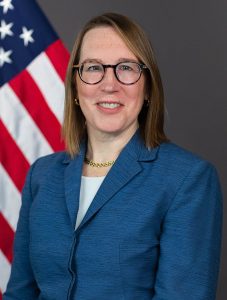A New Era at the SEC? My Takeaways from Hester Peirce’s Candid Discussion

I love attending the American Bar Association Business Law conferences. The networking, learning, and programming are unmatched.
At the Venture Capital Committee meeting, I was able to attend a Q&A session with SEC Commissioner Hester Peirce, which was was both refreshing and thought-provoking. Commissioner Peirce, known for her candid approach to innovation and regulation, covered a wide range of topics — with a particular focus on crypto regulation, disclosure reforms, and the future of U.S. capital markets.
Here’s what stood out to me.
A Reset in Crypto Policy
Commissioner Peirce made it clear: the SEC is trying to “reset” its approach to crypto. Instead of regulating by enforcement alone, the goal is to provide real, viable pathways for innovators to comply with existing laws. Peirce emphasized clearer jurisdictional boundaries, engagement with other agencies, and the hope for long-term legislative solutions to settle gray areas.
She discussed ongoing work within the SEC’s crypto task force, which is developing no-action letters, rule proposals, and guidance around tricky areas like stablecoins, custody, staking, and non-fungible tokens (NFTs). There’s also an openness to industry input — something she encouraged repeatedly.
The bottom line: the SEC is trying to move from ambiguity toward practical clarity, though it remains a slow and careful process.
Disclosure — A Common Ground
One of the sharpest points came when Peirce spoke about disclosures for digital assets. Whether an asset is classified as a security or falls under commodities rules, she argued that buyers need basic disclosures: Who’s behind the project? What are their plans? Are insiders holding large stakes?
The existing system, where enforcement actions fill the policy gap, is not sustainable. Instead, she wants upfront disclosures baked into the offering process — particularly for projects with a centralized development team. Once a project is truly decentralized, the disclosure need falls away.
It was refreshing to hear such a straightforward articulation of a principle many of us in the room agreed with.
Rethinking the Market Plumbing
Peirce also tackled a less flashy but vital topic: how the “plumbing” of financial markets could evolve. She described the potential for smart contracts and blockchain technology to streamline how securities are held, traded, and transferred — reducing settlement risks and cutting out unnecessary middlemen.
However, she warned that modernization must protect investors and maintain essential market functions like recordkeeping and voting. She favors principles-based regulation that can adapt over time rather than rigid rules that could quickly become outdated.
Her attitude seemed to strike the right balance: cautiously optimistic, but with both eyes open.
Private Markets and Accredited Investors
Beyond crypto, Commissioner Peirce turned to the growing dominance of private markets — and the concern that everyday investors are increasingly locked out. She called for revisiting the accredited investor definition, perhaps allowing people to qualify based on knowledge or professional experience rather than just wealth. The current requirements to be considered an accredited investor are either 1) having a $200k / year income ($300k if joint), or 2) a net worth of $1 million (excluding one’s home). Clearly, neither of these necessarily indicates a level of sophistication sufficient to determine risks associated with investment in unregistered, illiquid, and non-public securities. The current requirements incorrectly (in my view, and Commissioner Peirce’s) imply this sophistication, when the only way to truly pass the threshold of understanding is through education, which can be achieved independent of personal wealth or income.
Peirce sees a future where more retail investors can participate in early-stage growth companies, provided the right protections are in place. She stressed that regulation should not ossify around incumbents but should leave room for challengers and innovation. Changing the accredited investor requirements also expands the pool of usable capital.
Again, her remarks reflected a real awareness of how markets are changing — and a willingness to rethink traditional barriers.
Enforcement: A Needed Course Correction
Finally, Peirce addressed one of the elephants in the room: the SEC’s prior reliance on enforcement actions to set crypto policy. She acknowledged that using enforcement to shape law was an “unorthodox” and problematic approach. The new focus is on stepping back, writing better rules, and using the knowledge gained from enforcement teams constructively — without letting it drive policy by default.
For anyone worried about regulatory overreach, this was an encouraging signal.
Final Thoughts
As an attendee, I left the session with cautious optimism. Commissioner Peirce struck me as a regulator who truly values innovation, understands nuance, and isn’t afraid to admit when systems need fixing.
The SEC has enormous challenges ahead — from crypto to AI to revitalizing the public markets — but voices like Peirce’s give reason to believe that better days, and smarter rules, could be coming.
I’ll be watching closely to see how many of these ideas take root.



